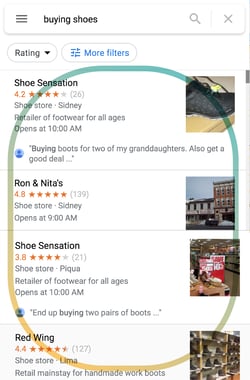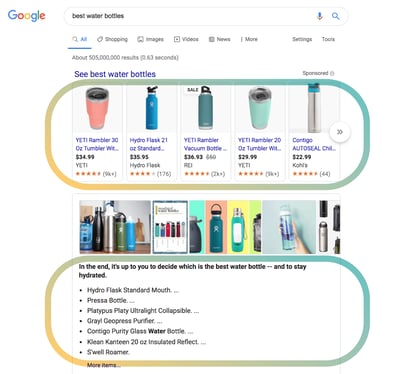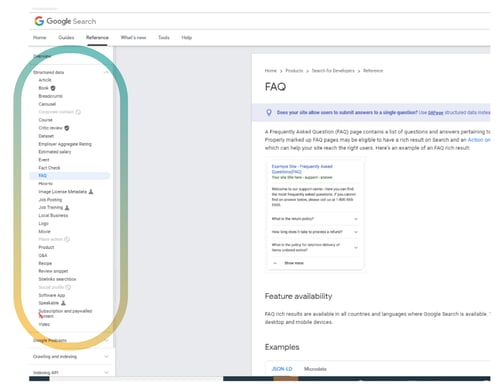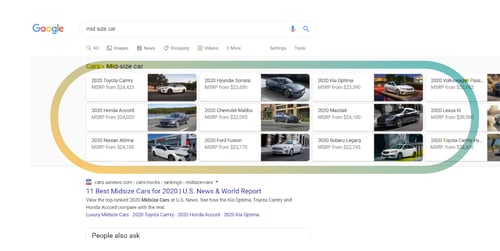Most important to any business website is being found by your target audience and getting them to take a desired action, whether that’s making a purchase, reaching out to sales or requesting more information. How does schema markup fit into the picture? In quick summary, it’s one of many Search Engine Optimization (SEO) tactics that can help your site outrank the competition. But it can be complex to do, so let’s break it down from the beginning.
What is Schema Markup?
Schema markup, also called structured data, is code implemented on the backend of a website to help define specific entities, actions and relationships. This code or “data vocabulary” makes it easier for search engine bots to better understand the meaning of web pages, and in turn, serve a faster answer and provide a better user experience for searchers. Essentially, it’s coding that speaks directly to search engines.
How Does Schema Work?
Websites with schema markup inform the user more quickly by providing additional information within the search result. With schema markup in place, you’re helping search engines make your search results more user-focused. And because search engines focus on returning the best results for users, sites with schema markup are more likely to rank higher in search results.
For example, instead of your website showing up with just the URL, page title and meta description, your website with schema markup will show up as a featured snippet, knowledge card or knowledge graph at the top of page 1. Or, your website may show up with review/rating stars, prices, pictures, videos and event dates -- all in the search result. These are called rich results.
The user is able to see more details at a glance. The schema markup makes it super easy for search bots to know what to display in search results to give users the best experience.
Here are some examples of search results that display a lot more than just the URL, page title and description:



Where Did Schema Come From?
The top search engines - including Google, Bing and Yahoo - first started collaborating in 2011 to create schema vocabulary. (If they all came together to do this, then I’d say it’s pretty important!)
The data language can be found at schema.org. It can be applied to a website manually, encoded on each specific item, or implemented via plug-ins and other tools.
Just like all other facets of Search Engine Optimization, schema markup is continuously evolving, changing and expanding, as algorithm updates happen every day. It’s also fairly complex.
In fact, Google’s senior webmaster is quoted as saying: ”We will have more types of structured data markup, and it will continue to get more complicated … Purely from a markup point of view, I don't see this getting any easier, unfortunately.”
Future of Schema
Schema markup will continue to evolve and expand with new language. Within the last year, Google has announced new structured markup options for podcasts and FAQs.
For podcasts, the markup can help podcasters show up in search results and on Google Podcasts, with individual episode descriptions and an embedded player right on the first page.
For FAQs, Google says that FAQ schema can be applied to any site that features a list of questions and answers on just about any subject. What’s nice about FAQ schema is that a company can earn position zero (what you see at the top of the search results page, above position 1, such as a knowledge graph) and take up a ton of real estate on the page.
As with all other types of schema, FAQ content needs to match what’s on your website 100% or the site may get docked by Google. Also, it’s important to note that FAQ content is purely informational in intent – and as such, you can’t use markup for free advertising.
Overall, by adding schema markup to a website, you’ll be better prepared for the future.
ROI of Schema Markup
What’s the ROI of schema markup? First,, your website is better positioned to stand out and rank ahead of the competition in search results.
Adding schema markup helps your site gain rich results, which provide a better user experience - and search engines like that! For customers, rich results are more eye-catching, can outshine your competition and even take up more real estate on the page, bumping your competitor websites to pages 2, 3, 4 and so on.
You also gain greater brand control. Schema markup gives you more control over the way your brand is represented in search results. You can define how you want your brand content understood and help control where and how the schema markup is distributed on the internet.
Lastly, your site can gain more clicks. Websites that show up on page 1 gain more brand awareness and more clicks than sites on subsequent pages. One of the primary goals of doing schema markup is to get rich snippets and features so your website ranks high and stands out. This results in customers clicking over to your website over that of competitors. In fact, case studies have shown retail sites are gaining up to a 30 percent increase in organic traffic via schema markup.
How to Do It?
Start with a schema markup strategy. No. 1 takeaway: you don’t need schema markup on every element on your website!
Build a strategy for why you are doing markup. Evaluate what parts of your business need to be understood by search engines and what results will achieve the most ROI.
Next, look at Google's list of structured data features and see which types of content you have on your site that align with your strategy. You might pick out reviews, videos, articles, FAQs, company contact information, recipes, etc. Below is a snapshot of some of the possible features.

Next comes the technical implementation best handled by a professional SEO expert and webmaster, whether he or she manually codes the sites or uses a plug-in to implement the code. It involves using code or JSON-LD (which is blocks of JavaScript code) implemented on the backside of specific web pages to inform search engines of specific elements.
For example, the code may connect certain products with certain prices so those products show up in the carousel on the top of a page when a user searches, as shown below.

While schema markup or structured data is extremely valuable, it is also complex. And as Google said, it’s only going to get more complex. Our advice is to let a professional SEO expert and webmaster handle it.
In Summary
The ultimate benefit of schema is that businesses gain increased visibility and consumers gain better search results. That’s a win-win!
Use our free SEO guide below to help you vet SEO tactics, services and agencies. You’ll get a checklist of questions to ask and tips on how to compare quotes and pricing.



